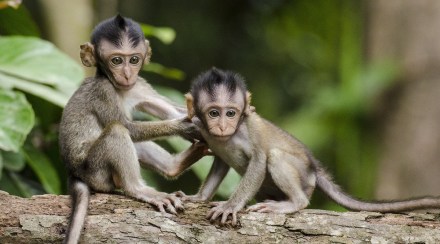China reported the first Monkey B virus infection in humans following the death of a Beijing-based veterinarian in May. The 53-year-old, who worked for an institution that works with non-human primates, had dissected two dead monkeys in March, local media has confirmed. The deceased had shown early-onset symptoms, including vomiting and nausea, in April. The vet’s death has sparked panic amid the raging Covid-19 pandemic that has yet to show any signs of slowing.
Local media reported that this was China’s first recorded human infection of the Monkey B virus. The virus was identified first in 1932 and infected only 50 people till 2020. Of these, 21 people died.
The alphaherpesvirus enzootic is found in macaques of the Macaca genus. The Monkey B virus is, so far, the only old-world-monkey herpesvirus to be identified that can cause severe human pathogenicity. The virus, which has a fatality rate of 70 to 80 per cent, is transmitted via direct contact and exchange of bodily fluids of monkeys.
The virus is very common in Macaque monkeys, and can be found in their faeces, saliva, urine, or spinal cord or brain tissue, according to the US Centre for Disease Control and Prevention (CDC). The virus can survive on surfaces for several hours, especially in a moist state. Human infections occur when an infected monkey bites or scratches them; get fluid or tissue from an infected monkey on broken skin, in eyes, nose, or mouth. Exposure to an infected monkey’s brain, spinal cord or skull.
According to the US CDC, symptoms usually appear within a month of the exposure, but could also occur within three to seven days. Flu-like symptoms, including fever and chills, fatigue, muscle ache, and headache are usually the first signs of the infections. These are followed by small blisters in the area on the body or the wound that came in contact with the monkey. Other symptoms include shortness of breath, vomiting and nausea, hiccups, and abdominal pain.
As it spreads, the virus causes inflammation of the spinal cord and brain, leading to inflammatory and neurologic symptoms. The infected person may also face problems with muscle coordination. The virus is also known to cause damage to the brain and the nervous system, and in extreme cases, death.
While there are no vaccines against the Monkey B virus, the chances of infection remain low with only veterinarians, laboratory workers or others exposed to monkey specimens at most risk. There has also been only one documented case of human-to-human transmission of the virus.
